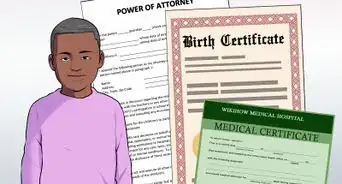This article was written by Jennifer Mueller, JD. Jennifer Mueller is an in-house legal expert at wikiHow. Jennifer reviews, fact-checks, and evaluates wikiHow's legal content to ensure thoroughness and accuracy. She received her JD from Indiana University Maurer School of Law in 2006.
This article has been viewed 33,340 times.
If you no longer live with the other parent of your child and the two of you cannot agree on a plan to share parenting time and responsibilities, you may need to appear in court for a hearing. At a child custody hearing, the judge will hear from both parents (and in some cases, a representative for the child) and determine the parenting plan that is in the child's best interests. Understanding the process and what is expected of you can help make the hearing less stressful. Although specifics vary among states – and even among different courts within one state – there are general steps you can take to make sure you are prepared for your custody hearing.
Steps
Starting a Custody Case
-
1File the appropriate forms. What forms you need to fill out, and when you need to file them, depends on whether you are filing for custody or responding to a petition filed by the other parent.
- If you are asking the court for custody, you'll file a petition. If the other parent has already filed a petition, you must file an answer to that petition. Depending on the jurisdiction, there may be a form you can fill out to answer the petition included in the papers you received from the other parent.
- If you're answering a petition, you only have a limited period of time, typically around 30 days, to file your response with the court. If you don't meet that deadline, you lose the opportunity to tell the court you disagree with the other parent's proposed plan.
- If child support is also an issue, you may have to fill out a financial declaration providing information about your income and expenses. Typically you can get this form from the clerk's office if you need it.[1]
-
2Have your forms served on the other parent. Once you've filed your forms with the court you must send the other parent copies of them.
- Generally, whenever you file any document with the court, you also must make sure that the other parent gets a copy of it.[2]
- You complete legal service by having someone over the age of 18 hand-deliver the paperwork to the other parent. You can't complete service yourself. You can get a sheriff's deputy or a private process serving company to complete service for a small fee.[3]
Advertisement -
3File proof of service with the court. To have a judge hear your custody case, you must be able to show that both parents have proper advance legal notice of the hearing.
- Sometimes if you use the sheriff's department or a private process server, they will file the proof of service for you. Make sure you ask if this is included, or if you have to file the form yourself.[4]
-
4Participate in mediation. Some courts require you to attempt to resolve your case using a neutral, third-party mediator before you schedule a hearing before a judge.
- Take mediation seriously and prepare for mediation to the same extent you would prepare for a court hearing. Although procedures and rules of evidence are more relaxed, you should bring documents with you that support your case and come with several parenting plans to present as options.[5]
- If you and the other parent are able to come to an agreement during mediation, this typically will form the basis of the court order and become legally enforceable.[6]
- If you and the other parent are unable to come to an agreement, the court may ask the mediator to provide a report or recommendation regarding the outcome of your custody dispute. These recommendations typically carry a lot of weight, and can greatly influence the judge's ruling.[7]
-
5Consider hiring an attorney. If your custody case is particularly complex or contentious, an experienced family law attorney can help protect your rights and the best interests of your child.
- Generally, if you can afford to hire an attorney you should go ahead and do so. Family law is complicated, and child custody proceedings can be emotionally traumatic.[8]
- If you don't believe you can afford an attorney, you should still explore free or reduced-cost services such as your local legal aid office or any law school clinics and see if you qualify.
Preparing Your Custody Case
-
1Research your state's child custody law. Understanding what factors the judge will evaluate is crucial to knowing what evidence will best support your case.
- Generally, judges determine custody based on the best interests of the child. This standard involves weighing many factors and has lots of room for judicial discretion. For this reason, making a good impression on the judge is of the utmost importance.
- Some of the factors judges evaluate include the age of your child, medical or developmental issues, your work and how much time you have to spend with the child, what sort of relationship the child has with you and with the other parent, the child's connection to his or her community, and any cultural or religious background or concerns, as well as any history of abuse or criminal activity on the part of either parent.
- If you have a teenager, he or she may have more say in the parenting schedule than if you have a younger child. Be ready for the court to ask for your child's input and take that into consideration when deciding on the appropriate custody arrangement.[9]
-
2Prepare your parenting plan. Before your hearing, you should review your schedule and your child's schedule to create several alternative time-sharing arrangements.
- If your hearing also includes a determination of child support, you'll need to fill out the court's child support worksheets and documentation of your income including recent pay stubs or copies of your tax returns.[10]
- Keep a daily log of events, both routine and special, related to your own life and the life of your child. Make note of things your child looks forward to as well as things your child dreads. Include any instances of disciplinary action you needed to take, as well as rewards for good behavior. Reviewing this log can help you see patterns you may not have noticed otherwise, enabling you to craft a parenting plan with your child's best interests at heart.
-
3Consider bringing witnesses. If you have friends or colleagues who have observed your interactions with your child, you should consider asking them to testify on your behalf.
- If you're representing yourself, practice with your witnesses before the hearing so you feel comfortable asking them questions. You also can brainstorm with them and ask them questions you think the other parent might ask, since they will be subject to cross-examination.[11]
- Witnesses you might use include any evaluator or guardian ad litem appointed for your child, and any social services workers or counselors who have worked with your child and will support your case. You also might consider your child's teachers or coaches.[12]
- Depending on your jurisdiction, you may be required to file a list of the names of your witnesses to the court and provide a copy of that list to the other parent before your hearing.[13]
- If you're not sure if a witness will show up to your hearing, you can have the court issue a subpoena.[14] Subpoenas also can be helpful if a witness needs a valid reason to miss work on the day of your hearing.
-
4Organize your evidence and information. Compile your information by topic in a binder or set of folders, and make sure you have multiple copies of everything you plan to present in court.
- Typically, you will need to bring at least three copies of all documents: one for yourself, one for the other parent, and one for the judge.[15]
- You might also consider including photos, or audio or video recordings, as evidence. For example, if the other parent called and left a threatening voicemail, you might use this as evidence that you should have custody of the child.
- Documentary evidence you might want to gather includes medical records, report cards, or correspondence with your child's teachers or counselors.
- Take notes for yourself on what you plan to say to the judge.[16] One option is to make a set of index cards. Go back to the list of factors judges review when determining the best interests of the child and write one factor on the top of each index card. Then write the points or facts you want to emphasize about that particular factor.
-
5Visit the court and observe other hearings. If you've never seen a child custody hearing, plan on attending one or two in the same courtroom where yours will be, if possible.
- In some jurisdictions, you may have more than one hearing. The first hearing usually is shorter, and only determines temporary custody until the final hearing can be scheduled.[17]
Attending Your Hearing
-
1Arrive at the courthouse early. You should make sure you have plenty of time to park, go through security, and get to your courtroom before your hearing starts.
- Although you don't necessarily have to wear a suit, you should dress in clean, conservative clothing. Leave your cell phone or other electronic devices at home or silence them so they don't make noise and disturb the court.[18]
- The judge may be hearing several cases the same day as yours, so you should sit quietly in the gallery of the courtroom until the judge calls your name. Listen to the other cases or review your own paperwork until it's your turn to present your case.[19]
-
2Present your case. The judge will ask the parent who filed the petition for custody to speak first, then the other parent will be given the opportunity to speak.
- Speak loudly and clearly so the judge can hear you, and keep your comments brief. Stick to the facts and avoid emotional outbursts or accusatory statements. Instead of attacking the other parent, keep your focus on the best interests of your child.[20]
-
3Listen to the other parent. When the other parent is speaking, listen quietly and refrain from interrupting or openly expressing disagreement.
- If the other parent calls any witnesses, you'll be able to ask them questions after the other parent has finished. Listen to the other parent's questions and the witness's answers, and make note of anything you want to question the witness further about. However, avoid asking a question if you don't know what the answer will be.[21]
- Even if you disagree with something the other parent has said, refrain from interrupting or arguing with him or her. Speak only to the judge (or a witness, if you're questioning him or her), and only when asked to speak. Your goal is to prove to the judge how calm and reasonable you are.[22]
-
4Answer any questions. Once both you and the other parent have presented your cases, the judge may have additional questions to ask.
- Keep your answers clear and concise, and stick to the facts rather than having an emotional outburst or insulting the other parent.[23]
- If at any time you don't understand a question, let the judge know. Likewise, if you don't know the answer to a question, don't be afraid to say that you don't know. Don't worry about looking foolish because you don't know the answer to something – you'll look worse if you say something that later turns out to be false.[24]
-
5Receive the judge's ruling. After hearing from both parties, the judge may make a ruling from the bench, or take some time to review the evidence and then make a decision.
- Remain polite, whatever the judge says, and refrain from openly disagreeing or protesting the judge's decision. If you don't like the judge's ruling, you have the right to appeal.[25]
- Before you leave the courtroom, make sure you understand what you need to do next. The judge may ask you to write the order, or expect the other side to do so. Once the order is signed, you'll need to get copies from the clerk.[26]
References
- ↑ http://www.washingtonlawhelp.org/resource/basic-tips-on-how-to-prepare-for-a-court-hear?ref=XTySM
- ↑ http://www.washingtonlawhelp.org/resource/basic-tips-on-how-to-prepare-for-a-court-hear?ref=XTySM
- ↑ http://www.courts.ca.gov/selfhelp-serving.htm
- ↑ http://www.courts.ca.gov/selfhelp-serving.htm
- ↑ http://family-law.freeadvice.com/family-law/child_custody/child-custody-mediation-preparation.htm
- ↑ http://heleneltaylor.com/preparing-for-a-child-custody-battle/
- ↑ http://family-law.freeadvice.com/family-law/child_custody/child-custody-mediation-preparation.htm
- ↑ http://www.washingtonlawhelp.org/resource/basic-tips-on-how-to-prepare-for-a-court-hear?ref=XTySM
- ↑ http://heleneltaylor.com/preparing-for-a-child-custody-battle/
- ↑ http://www.washingtonlawhelp.org/resource/basic-tips-on-how-to-prepare-for-a-court-hear?ref=XTySM
- ↑ http://www.washingtonlawhelp.org/resource/basic-tips-on-how-to-prepare-for-a-court-hear?ref=XTySM
- ↑ http://www.washingtonlawhelp.org/resource/basic-tips-on-how-to-prepare-for-a-court-hear?ref=XTySM
- ↑ http://www.washingtonlawhelp.org/resource/basic-tips-on-how-to-prepare-for-a-court-hear?ref=XTySM
- ↑ http://www.washingtonlawhelp.org/resource/basic-tips-on-how-to-prepare-for-a-court-hear?ref=XTySM
- ↑ http://www.washingtonlawhelp.org/resource/basic-tips-on-how-to-prepare-for-a-court-hear?ref=XTySM
- ↑ http://www.washingtonlawhelp.org/resource/basic-tips-on-how-to-prepare-for-a-court-hear?ref=XTySM
- ↑ http://heleneltaylor.com/preparing-for-a-child-custody-battle/
- ↑ http://www.washingtonlawhelp.org/resource/basic-tips-on-how-to-prepare-for-a-court-hear?ref=XTySM
- ↑ http://www.washingtonlawhelp.org/resource/basic-tips-on-how-to-prepare-for-a-court-hear?ref=XTySM
- ↑ http://www.washingtonlawhelp.org/resource/basic-tips-on-how-to-prepare-for-a-court-hear?ref=XTySM
- ↑ http://www.washingtonlawhelp.org/resource/basic-tips-on-how-to-prepare-for-a-court-hear?ref=XTySM
- ↑ http://www.washingtonlawhelp.org/resource/basic-tips-on-how-to-prepare-for-a-court-hear?ref=XTySM
- ↑ http://www.washingtonlawhelp.org/resource/basic-tips-on-how-to-prepare-for-a-court-hear?ref=XTySM
- ↑ http://www.washingtonlawhelp.org/resource/basic-tips-on-how-to-prepare-for-a-court-hear?ref=XTySM
- ↑ http://www.washingtonlawhelp.org/resource/basic-tips-on-how-to-prepare-for-a-court-hear?ref=XTySM
- ↑ http://www.washingtonlawhelp.org/resource/basic-tips-on-how-to-prepare-for-a-court-hear?ref=XTySM









































































